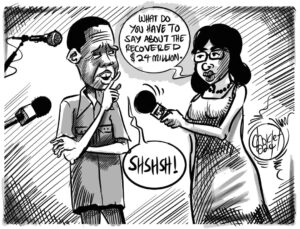Home Affairs Minister Stephen Kampyongo has cautioned Inspector General of Police Kakoma Kanganja and his officers to ensure that they make decisions which are in accordance with the Zambia Police Act and the Constitution.
Speaking at the launch of the Zambia Police Service direct deposit system in Chelstone yesterday, Kampyongo commended Kanganja for reversing his decision to recruit eight Chinese nationals as Zambia Police reservists.
“Before I conclude, just allow me to caution you Inspector General and your command that ours is not to politically interfere with your day to day operations because you are a professional entity, but ours is to ensure that we provide policy guidance and advice so that you serve the public better. And therefore we appreciate your need to engage in community crime prevention initiatives such as neighborhood watch, police reserves and indeed other initiatives that are intended to curb crime in our country,” Kampyongo said.
“But my caution and advice is that we must always do this following the rules and procedures on how to engage in these initiatives in accordance with what is stipulated in your Acts and also the Republican Constitution. And to this call, I would like to just commend you for heeding to our advice and listening to your people in revisiting the decision that you had earlier made. That is how it should be because we are here to serve the people and we should make sure that we serve them to their expectations.”
Later, when journalists pressed Kampyongo on whether Kanganja’s reversal was a sign of weakness after the official programme ended, he said everyone made mistakes.
“How can that be a weakness? In fact that should be a strength. You as a journalist you, you cannot tell that you are always perfect and you don’t make mistakes. That is why there is an editor. So if there was a slip up on the part of the IG, that is why there is a Minister of Home Affairs to check that and that’s how things work. So it should be seen as a strength. There is strength in acknowledging our oversight and correct them. That is how it should be. Unless you are telling me you want people who are arrogant and don’t listen to you even when you cry. We are all prone to error and behind uniforms, they are all human beings just like you and me,” he said.
Meanwhile, Kampyongo said the new direct deposit system would not only enhance accountability and transparency in the handling of non tax revenue collected by the Zambia Police Service but also enhance public confidence.
“I must however caution the Zambia police command that the expected increase in the non tax revenue from the direct deposit system may not be realised especially if the front line officers managing the system are not adequately trained. To avoid any potential revenue losses, I hereby direct that all the front line officers who will be involved in managing the direct deposit system should receive adequate training before being deployed in the system,” Kampyongo said.
The minister urged members of the public to desist from encouraging public officers to accept bribes.
“We expect that the direct deposit system to enhance non tax revenue curb the persistent perception of corruption and theft by public servants. Members of the public in this regard should desist from the common practice of encouraging public officers to accept bribes which not only undermines the moral fiber of our country but also denies the treasury the much needed revenue. And normally, I have never heard of a police officer who goes to strangle a member of the public to squeeze money from the pocket but the members of the public will at many times and willingly knowing in some cases moving with defective vehicles will be the ones even rolling on the floor to try and extend a little bit from their pockets but they are the first ones to even jump on the ant hill and shout corruption and pointing one finger forward and forgetting about the rest of the fingers pointing at the members of the public as well,” said Kampyongo.
The direct deposit is a new system which will enable the public to pay fees and fines through bank deposits without police officers handling cash directly and the pilot project was implemented on December 1, 2017.
Among the services that members of the public will be required to make bank deposits are acquisition of a firearm license, interpol feels, finger prints, admission of guilt fee, and police reports among others.
And the ministry has engaged Indo-Zambia Bank, Investrust, and Zanaco as banks their points of payment.













One Response
Kampyongo should not make us think the IG made that decision unilaterally, Kanganja is just a scapegoat unfortunately. Kanganja is the very one that barred his officers to marry foreigners citing national security reasons and today his commissioning foreigners as police reserves??? There is some force that he could not stand against that made him to act in such a manner. Unfortunately Kanganja is not courageous enough to tell his political masters what is right and acceptable in the Zambia Police law system hence looking a fool now in the eyes of the zambian people.
This now brings me to my point. Kanganja should resign as Zambia police IG because he is a danger to Zambia national security. We can not afford to have an IG that can not stand to defend the laws of Zambia later on be indecisive. Kampyongo too can not be asking the Zambian people to forgive Kanganja on this immature act, he too is a danger to national security and must be replaced. Ministerial positions like Home Affairs and Defense should have personalities that are alive to the national security issues and national security should be at the core of their being. All in All ladies and gentlemen of Zambia, the PF government is not sensitive to our security, this act alone has shown it so. And failure by the President to fire Kampyongo and Kanganja attest to this fact.